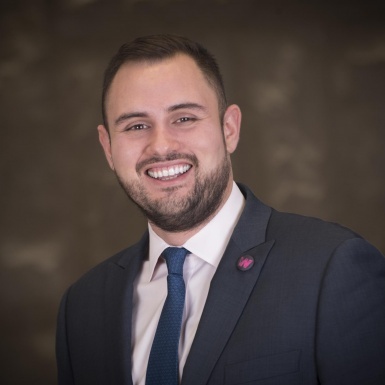A Lesson From Those With Physical Disabilities
Sign up and receive information on the latest news and updates.
This post originally appeared on Huffington Post. - Trish
Recently, well-known Alzheimer's advocate and 12-year early onset Alzheimer's sufferer, Michael Ellenbogen, shared his frustration about the lack of pace in the fight against Alzheimer's in written testimony to the U.S. Department of Heath and Human Services (HHS). Was a mass shooting similar to Columbine necessary to draw more attention to Alzheimer's? he asked. "I would never do that ... I am trying to get your attention and I am failing and dying at the same time." At this point HHS security deemed Mr. Ellenbogen a threat and banned him from all federal buildings. While Mr. Ellenbogen's situation was finally resolved -- after several months and the help of pro bono counsel -- this illustrates the amount of misunderstanding and fear associated with Alzheimer's.
The daily struggle to get from point A to point B becomes a terrifying leap into a world of the unknown. And your response leads others to fear that you have lost your mind and may be a danger to yourself or the public.
Alzheimer's affects close to 5.1 million people age 65 and older and is expected to increase 40 percent over the next decade. While these numbers are daunting, an even larger number -- 15.5 million -- are friends and family members who take on the responsibility to care for those they love, even leading them into their own world of anxiety, stress, depression, financial loss, and worse.
It doesn't have to be like this.
On the heels of World Alzheimer's Day (Sept. 21), let's pledge to do something about it. Let's learn a lesson from what we are doing in our communities for those with physical disabilities. For too long, people with physical disabilities were forced to manage a society that was ignorant and intolerant of their needs and challenges, much like what those with cognitive disabilities and their families experience today. Both suffer a social stigma, and both are forced to live in the shadows of communities that don't understand and, therefore, are not equipped to serve their needs. Yet, with curb cuts, ramps, and special parking consideration, among other aids, we have made our communities increasingly 'disabled friendly'.
So what would a 'dementia friendly' community look like? It starts with simply raising awareness about dementia so we can change attitudes towards those who suffer from cognitive impairments. While we can't mandate that citizens be kind and patient, educating communities about what Alzheimer's is and how those with dementia can be recognized and helped can improve dynamics, smooth out interactions, and mitigate the stigma attached to the disease.
We are all used to seeing elevators and ramps in subway stations, at restaurants, and in stores, for those in wheelchairs or using walkers. Similarly, an increased use of clear and accessible signage in such places could help remind patrons with Alzheimer's of where they are when they need it. So would easy-to-use visual keypads with pictures of families and friends for those who can't remember phone numbers; and biometric ATM's for those who are unable to remember their PIN numbers. Taking away the fear of forgetting would go a long way in restoring the dignity and independence many with dementia cannot enjoy. We need 'cognitive curb cuts' in our communities.
Tapping into easy-to-use innovative technologies tailored for those with memory impairments could also help reduce dependence and provide a sense of control for those with Alzheimer's. From smartphone apps to satellite navigation systems, scientists are applying technologies to fit specific memory needs. There are many groundbreaking community-wide efforts to alter physical and social environments, increase community resources and educate service providers in cities and counties across the country - from Prince George's County, Maryland to Denver, Colorado -- that are part of a dementia-friendly movement.
This is America's hometown family disease. Until there is a means of prevention and treatment for Alzheimer's, each of us, in our hometowns across the country, should welcome back millions too afraid to come out of the shadows.
We owe that much to our families, friends and neighbors. It's time to show them we hear them and we care.
This piece was co-authored with Trish Vradenburg, George and Trish Vradenburg are the founders and Co-Chairs of UsAgainstAlzheimer's.
